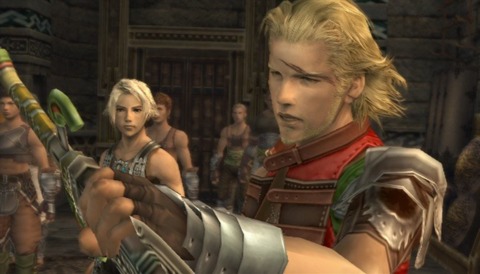Final Fantasy XII vets talk game localization
PAX 2009: Former Square Enix localizers Alexander Smith and Joseph Reeder present the challenges faced when translating Japanese dialogue.
Who Was There: Former Square Enix employees Alexander O. Smith and Joseph Reeder share the process of game localization with the 2009 Penny Arcade Expo audience on the final day of the show.

What Did They Talk About: Smith and Reeder's presentation went over a laundry list of points they keep in mind as they tackle a localization project. Using Final Fantasy XII in most of their examples, they discussed what they do to create the best experience possible for English-speaking gamers.
One of their first key points was transparency because the writing in a game should never draw attention to itself. Smith pointed out the fact that Japanese game companies are now beginning to realize that good translators need to not only be fluent in both languages, but they also need to be strong writers in the target language.
Anyone who speaks more than one language will understand that humor can be difficult to translate because what is considered funny in one culture may not make sense in another. According to Smith, there can only be so many jokes about fermented soy beans, but he noted that the humor should stay and that he would sometimes have to step back to let the characters personalities shine through. He also pointed out that whenever he had the opportunity, he would consume as much pop culture as possible.
Cultures differ even among groups of gamers. What gamers expect from their interaction with non-player characters differs between the Japanese and Western audience. Reeder talked about how Japanese games don't try to cover up the fact that they're about to give the player useful information. An example he gave was the text, "Hey Vaan, this is a chocobo." Reeder and Smith would instead find a way to weave the important gameplay mechanics or instructions into the dialogue, without having it be jarring and interrupting the immersion.
Smith also noted that "translation should fulfill the potential of the target language." He went on to talk about how they had to rebuild the world of Final Fantasy XII and find something that would make sense to the American audience. Using accents was a way for them to immerse the player into the world of Ivalice, so the Imperials ended up adopting a British accent and the Resistance had an American one.
To pull off the accents, finding the right voice actors was also part of their job. They recruited several British stage actors to fulfill the roles of the judges in the game, as well as child actors to voice the younger characters. In Japan, it is common to have female actors instead of children play the role of the child, but Smith and Reeder agreed that while trained voice actors can be extremely good at what they do, they were happy with the decision to cast a young actor to voice the character Larsa in Final Fantasy XII.
Not only are the voice actors needed for their acting skills, but they also have to be able to time their spoken dialogue to the animation. It's common to watch cinematic sequences in games and notice that the lip movements are not synched with the translated dialogue. Smith and Reeder would spend days on a single scene, writing and rewriting dialogue so that it would fit the animation. Voice actors have to watch the video as it runs and time it while they deliver their lines. They went on to note that spoken text made up 7 percent of all the text in the game and took nine months to translate. The remaining 93 percent took another seven months.
Random Trivia: Wording for the bestiary in Final Fantasy XII was modeled after a Victorian handbook on medicinal herbs.
The Takeaway: It's clear that a lot of time and effort goes into localization, which can explain why there is usually a delay between the Japanese and North American release date for games. For those who are interested in getting into this segment of the industry, the panel's advice was to become proactive and seek out opportunities.
Another Crab's Treasure Is A Soulslike 3D Platformer | GameSpot Review Stellar Blade Review Super Monkey Ball Banana Rumble - Official Multiplayer Features Trailer Nintendo 64 – April 2024 Game Updates – Nintendo Switch Online PUBG | Erangel Classic Returns Gori: Cuddly Carnage | Meow Launch Date Announcement Trailer Genshin Impact - "Arlecchino: Afterglow of Calamity" | Collected Miscellany Marvel Rivals - Official Loki Character Reveal Trailer | The King of Yggsgard Fortnite Festival - Official Billie Eilish Cinematic Season 3 Trailer Remnant 2 - The Forgotten Kingdom | DLC Launch Trailer Stellar Blade - Official "The Journey: Part 2" Behind The Scenes Trailer | PS5 Games Dead by Daylight | Tome 19: Splendor | Reveal Trailer
Please enter your date of birth to view this video
By clicking 'enter', you agree to GameSpot's
Terms of Use and Privacy Policy
Got a news tip or want to contact us directly? Email news@gamespot.com
Join the conversation